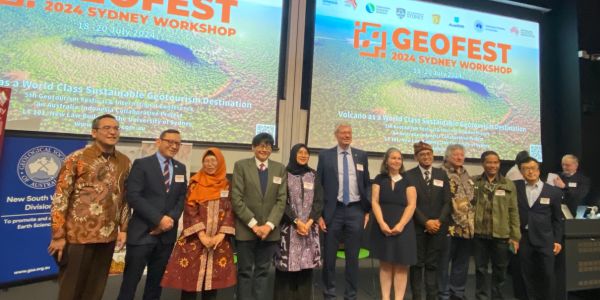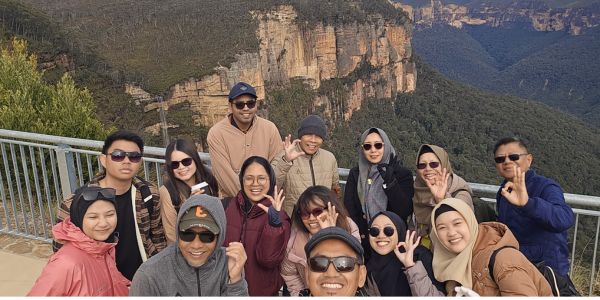Geofest 2024 – Cementing collaboration with Indonesia

GEOFEST 2024 Sydney Workshop, The University of Sydney. Image courtesy of Yunie Rahmat.
The 5th Geotourism Festival and International Conference 2024 was initiated by the Indonesian Geoparks Network (IGN), a geopark network in Indonesia comprising 10 UNESCO Global Geoparks and more than 10 national geoparks.
The Conference includes a one-day workshop in a partner country, this year it was hosted in Australia. The GEOFEST 2024 Sydney Workshop, comprising the Workshop and further days devoted to tours and a special Wildlife Tourism workshop, was convened from 18-20 July. It was an international event attracting 100 delegates including geoscientists, environmental professionals, educators, students, and tourism planners/managers/operators. The workshop represented a direct response to a recent MOU arranged between the Australian Geoscience Council Inc (AGC), of which AusIMM is a member, and the IGN. The focus of the workshop event was on building a strategy framework for geotourism development in destinations where the volcano was reviewed as a key attraction.
The main workshop
The GEOFEST event was co-hosted by The University of Sydney. In his welcoming address, Dr Jon Hronsky OAM MAusIMM, Chair of Geotourism Australia (and entity of the AGC) said that the event is the first international joint co-hosted geotourism project organised in Australia with our closest neighbour Indonesia, and with New Zealand as a warmly invited participant. In responding by way of an official welcome, H.E. Ambassador Dr Siswo Pramono of the Republic of Indonesia advised that he was very pleased to see this significant event taking place. In a separate address, Dr Pramono explained how the development of the Natuna Geopark related to the socio-economic development of the Riau Archipelago Province of Indonesia.
Ipuk Fiestiandani Azwar Anas, Regent of Banyuwangi, Banyuwangi Regency of East Java, Indonesia then spoke about the impacts of volcano geotourism and the UNESCI Ijen Global Geopark on enhancing economic development in the East Java Province, precisely in Banyuwangi where per capita income continues to rise and the poverty level decreases. Farid Z Mohamad, Chairman of the IGN, discussed managing volcano geotourism destinations to sustain local communities. He explained that by demonstrating the efficacy of collaborative approaches, community empowerment, and holistic management strategies, Indonesian geoparks serve as a beacon for other volcanic destinations aspiring to balance conservation efforts with socio-economic benefits. This study underscores the global imperative for sustainable geotourism practices, emphasising the critical role of scientific research and stakeholder engagement in nurturing resilient and inclusive tourism ecosystems. Dedy Asriady, Head of Genung Rijani National Park Office in Lombok, discussed the social and economic impacts of geotourism of Gunung Rinjani National Park in West Nusa Tenggara.
For the Australian side, in a follow-up presentation, Dr Hronsky affirmed that the AGC is fully supportive of working with global partners, particularly in the Asia Pacific Region. He advised that engagement with the Australian mining industry in developing geotourism strategies for maximising the value of cultural landscapes, particularly in regions where mining operations are facing closure was a top priority. With a further commitment to digital transformation strategies through the design and development of the Australian Geotourism Discovery Portal, Jon Hronsky further suggested that the AGC is becoming a leader in nature-based tourism in Australia.
Professor Phil McManus from USYD Geosciences explained that many parts of regional and remote Australia are looking for opportunities to rejuvenate their local economy. Volcanic landscapes, which exist from Far North Queensland to Tasmania and west to Mount Gambier in South Australia, offer sustainable geotourism potential. His presentation explored what it might mean to build sustainable tourism around volcanic landscapes in parts of eastern Australia, what are the opportunities and challenges and how this may enhance the protection and awareness of crucial geological features and processes. Both volcano geotourism specialist Patrica Erfurt and Savannah Guides General Manager Russell Boswell were able to provide the audience with a comprehensive overview of past volcanic activity across Australia and Far North Queensland, respectively. Sasha Morriss, Geoeducator and Geoscientist of the Waitaki Whitestone UNESCO Global Geopark, discussed the evolution and rationale for New Zealand’s first geopark.
With a focus on the role of geoscientists in geotourism development, Professor Mega Fatimah Rosana, Dean of the Faculty of Engineering Geology, Padjadjaran University in West Java, advised in considerable detail how geoscientists play a multifaceted role in bridging scientific knowledge with practical applications to promote sustainable geoparks and geotourism and to protect geological heritage in the areas of geodiversity, geoheritage, geoconservation, and protection; education, research, and monitoring; interpretation, geotourism promotion and planning; and collaboration and advocacy.
With a further commitment to digital transformation strategies through the design and development of the Australian Geotourism Discovery Portal, this theme was explained by NGS Working Group Chair, Mark Williams, who outlined a range of opportunities for geoscientists (including other ‘geo-professionals’) through volcano geotourism. Furthermore, Mark suggested that the geoscientists and geopark practitioners could be engaged in activities related to data collection and analysis, content creation and curation, visitor education and engagement, and sustainable practices advocacy.To bring together all these themes, the workshop included two panel sessions entitled ‘Geotourism and sustainable development’ as well as ‘Geotourism opportunities for geoscientists.’
The welcoming dinner at The University of Sydney
The dinner, attended by 60 guests, featured speeches firstly by Elizabeth Thurbon, Professor of International Political Economy, School of Social Sciences, University of New South Wales. Elizabeth spoke about the opportunity for applying economic and cultural statecraft based on successful models developed in East Asia, so important for Australia’s future relationship with its closest neighbour. Ipuk Fiestiandani Azwar Anas, Regent of Banyuwangi then spoke about the significance of the development of a close and warm relationship through the auspices of geotourism and UNESCO Global Geopark development.

Blue Mountains Tour group enthusiasts. Image courtesy of Farid Z Mohamad.
Sponsorship acknowledgements
The GEOFEST 2024 Sydney Workshop was co-hosted by generous sponsorship from various AGC member societies (including AusIMM and the AusIMM Sydney Branch, the Australian Institute of Geoscientists, and The Geological Society of Australia), as well as by the Sydney Minerals Exploration Discussion Group (SMEDG). Geoscience Society Chair David Turvey and Ian Wollff were also actively involved as members of the GEOFEST Advisory Committee.
GEOFEST 2024 event has continued to forge new and friendly relationships amongst geotourism practioners in the Asia Pacific Region. It has also provided fresh insights based on the Indonesian experience into the extent of input required by geopark proponents coupled witth broad support from government agencies and communities that is necessary to secure UNESCO approval of sustainable projects. In addition, the event has demonstrated what members of professional geoscience groupings can achieve by collaboration and shared funding support, working within the framework of a cohesive national strategic framework.